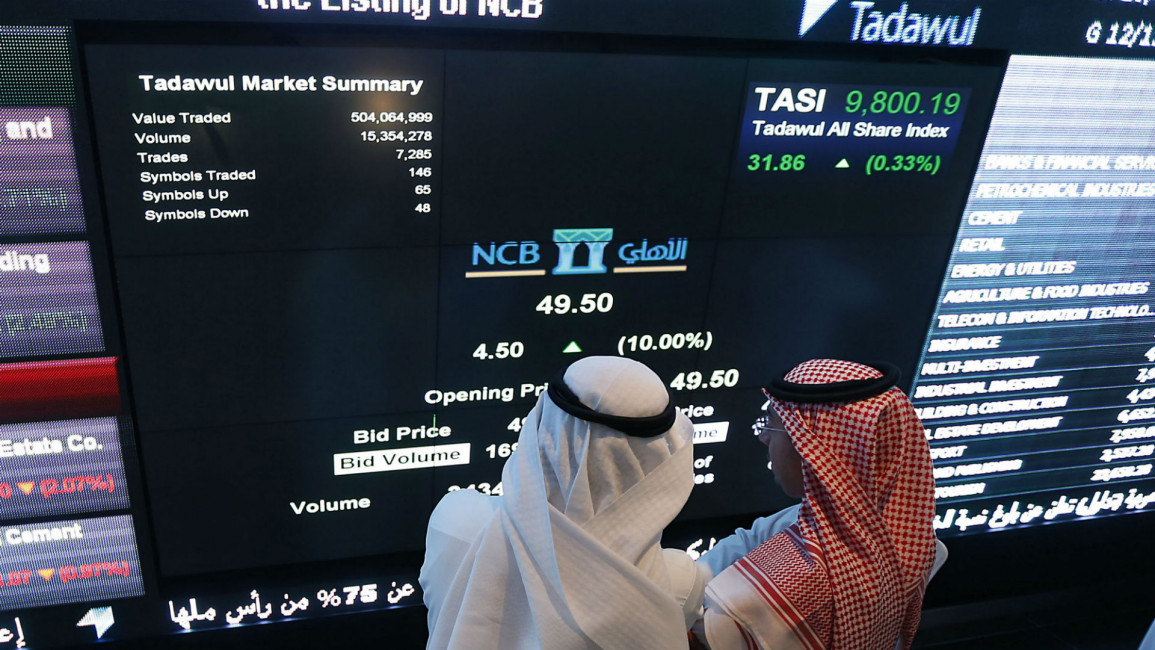Saudi stock market opens to foreign investment
Saudi stock market opens to foreign investment
Foreign investors are allowed to trade on the Saudi stock market for the first time from Monday, but with heavy restrictions.
2 min read
Foreign investors can now buy shares in the Saudi stock market, with restrictions (AFP).
Foreign investors are allowed to trade shares on Saudi Arabia's stock market for the first time on Monday, although there are heavy restrictions on those trying to invest.
To register on the Tadawul All-Shares Index, the Arab world's largest exchange, as a Qualified Foreign Investor (QFI) an overseas institution must have a five-year track record, with at least 18.75 billion riyals ($5 billion, 4.5 billion euros) under management.
Each QFI can hold no more than five percent of a stock, and QFIs and their clients together are limited to 20 percent of any one listed company.
Only foreign banks, brokerage houses, fund managers and insurance companies based outside the Gulf can qualify as QFIs.
Shortly after opening at 0800 GMT, the index was up 0.45 percent or 43.26 points at 9687.83
In a notice issued Sunday, the exchange confirmed that "as of Monday... Qualified Foreign Investors can commence dealing in listed shares."
Analysts believe that there will not be a rush of funds into the Saudi stock market.
"There will remain heavy restrictions... on foreign equity ownership," the Capital Economics research group wrote.
The measures "could be seen as the first step in a broader liberalisation" of the economy in a country traditionally cautious about foreign political and economic influence, the firm said.
The head of research at Alistithmar Capital, Mazen al-Sudairi, said that the new rules are not about boosting investment, despite estimates that foreign investment in the market could eventually reach $40-$50 billion.
"We don't need that in the Saudi market," said al-Sudairi.
He said the kingdom, which is part of the G20 group of the world's largest economies, already has good liquidity and high foreign exchange reserves.
Sudairi and other analysts believe the main payoff from attracting foreign investors will be improved transparency, accountability, and availability of macroeconomic data, alongside reduced market volatility.
A fifth of the market consists of petrochemical firms, whose earnings are tied to oil prices that have plunged 40 percent from a year ago, Capital Economics said.
Saudi Arabia, the world's leading oil exporter, faces a budget deficit of 20 percent of gross domestic product this year because of lower oil revenues while government spending stays strong, the International Monetary Fund has projected.
To register on the Tadawul All-Shares Index, the Arab world's largest exchange, as a Qualified Foreign Investor (QFI) an overseas institution must have a five-year track record, with at least 18.75 billion riyals ($5 billion, 4.5 billion euros) under management.
Each QFI can hold no more than five percent of a stock, and QFIs and their clients together are limited to 20 percent of any one listed company.
Only foreign banks, brokerage houses, fund managers and insurance companies based outside the Gulf can qualify as QFIs.
Shortly after opening at 0800 GMT, the index was up 0.45 percent or 43.26 points at 9687.83
In a notice issued Sunday, the exchange confirmed that "as of Monday... Qualified Foreign Investors can commence dealing in listed shares."
Analysts believe that there will not be a rush of funds into the Saudi stock market.
"There will remain heavy restrictions... on foreign equity ownership," the Capital Economics research group wrote.
The measures "could be seen as the first step in a broader liberalisation" of the economy in a country traditionally cautious about foreign political and economic influence, the firm said.
The head of research at Alistithmar Capital, Mazen al-Sudairi, said that the new rules are not about boosting investment, despite estimates that foreign investment in the market could eventually reach $40-$50 billion.
"We don't need that in the Saudi market," said al-Sudairi.
He said the kingdom, which is part of the G20 group of the world's largest economies, already has good liquidity and high foreign exchange reserves.
Sudairi and other analysts believe the main payoff from attracting foreign investors will be improved transparency, accountability, and availability of macroeconomic data, alongside reduced market volatility.
A fifth of the market consists of petrochemical firms, whose earnings are tied to oil prices that have plunged 40 percent from a year ago, Capital Economics said.
Saudi Arabia, the world's leading oil exporter, faces a budget deficit of 20 percent of gross domestic product this year because of lower oil revenues while government spending stays strong, the International Monetary Fund has projected.



